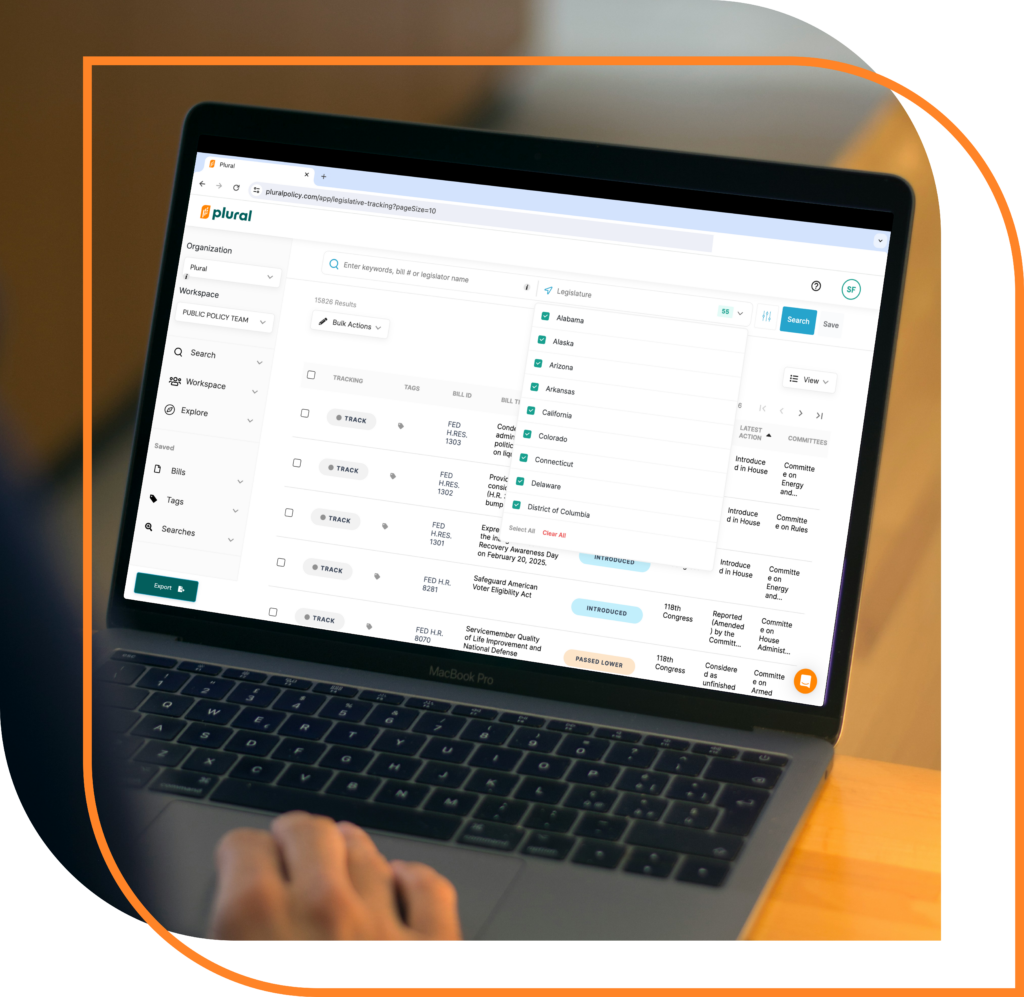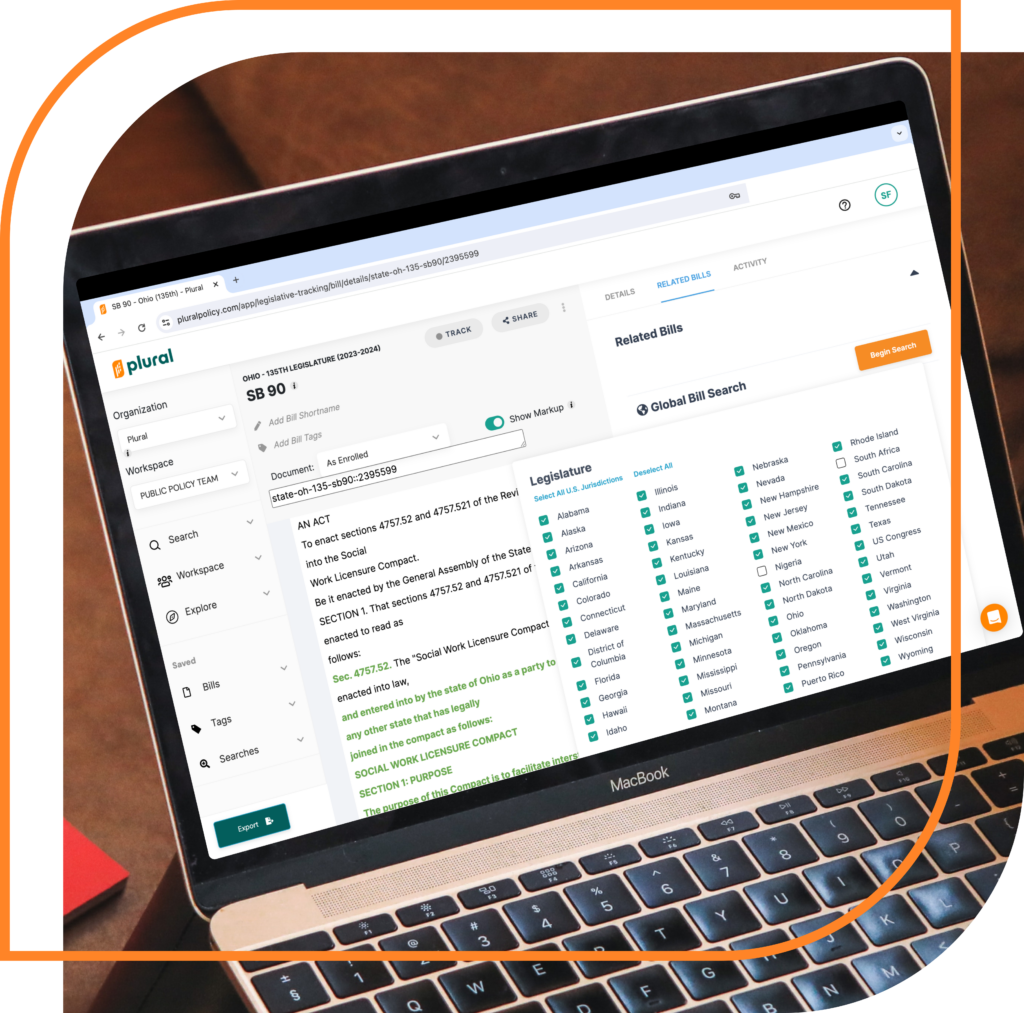Federalism provides many benefits for policy watchers and advocates with a national focus. Fifty state governments means 50 opportunities to enact change at the state level. Legislators can also learn from the experiences of other states — policy rollouts often improve as they move from state to state. A recent example of this occurred in North Carolina in 2023. State legislators had the opportunity to review the benefits of Medicaid expansion in other states before pursuing their own expansion.
But the multi-layered, somewhat decentralized nature of policymaking creates significant challenges as well. Anyone with a national focus must manage legislative discovery and tracking for Congress, as well as across state legislatures. Ensuring they’re aware of all relevant developments within each jurisdictions is challenging. Effectively managing time and resources adds tremendous difficulty.
Of course, well-equipped government relations and advocacy teams are designed to meet these challenges. National teams may have access to in-state lobbyists and organizers, communications tools, insider research, and more. But the most vital tools for any policy team with a national focus is a legislative intelligence system. Plural is the premier option for policy teams working across the country. In this blog, we detail what Plural offers, and why it is an invaluable tool for national policy teams.
What is a Legislative Intelligence Tool?

A legislative intelligence tool is a dynamic digital platform designed to enhance the process of researching, tracking, and influencing public policy processes. Centered around legislative tracking, they alert users to new legislation or amendments, upcoming public hearings, and important votes on the issues that matter to the user. Legislative intelligence tools should serve as a hub for all stakeholders — including lobbyists, advocates, researchers, the public, and legislators themselves. Anyone with a stake in the legislative process can use the tool to make informed decisions and achieve policy goals.
But the benefits of a legislative intelligence tool extend far beyond legislative tracking. These tools unlock information that can lead to success. This might include AI-powered insights and predictions, data on legislators and their staff, and historical details that could inform the current legislative process. These insights will make it easier for policy teams to identify trends, lobby effectively, and make better decisions.
Finally, a well-designed legislative intelligence tool should make information easier to digest. Legislative datasets are complex — legislative intelligence tools are designed to make connections and intuitively display information. As such, these tools can mimic the statehouse veterans whose mastery of the legislative process is informed by decades of experience. With this level of intelligence, a legislative intelligence tool like Plural can make a policy expert in Maryland feel deeply connected to an ongoing debate in Oregon.
Easy Access to Cross-Jurisdictional Intelligence
Like the capitols and legislators they serve, state legislative websites vary greatly. Some include advanced tracking features that make it easy to follow policy developments. Others look and feel like they haven’t been updated since the early 2000s. Regardless, tracking policy developments using just state-provided resources is certainly possible. But this work requires spreadsheets, considerable time, and nonstop visits to a difficult website. Once policy experts’ work expands from one jurisdiction to many, relying on state websites leads to inefficient, duplicative work. This is, of course, where Plural leads to easy efficiency gains.
Plural’s jurisdiction filter allows users to search within any or all jurisdictions. Advanced search filters allow users to narrow down results across the selected jurisdictions. For instance, users can use advanced search to filter by bill status or latest action date.
Plural’s AI-powered Global Bill Search tool goes even further. With Global Bill Search, Plural users can search for similar legislation across additional jurisdictions. This is a great way to identify trends and keep stakeholders up-to-date on every bill within a given topic, regardless of jurisdiction.

Finally, Plural’s intuitive UI makes tracking and organizing cross-jurisdictional information easy. For instance, Plural’s Explorer heatmap allows policy teams to easily stay up-to-date on the number of bills they’re tracking in each jurisdiction. Policy teams can also use the heatmap to quickly see information on legislators, committees, and staff members.

Following Congress
Anyone with experience following or advocating for policy in Congress knows it’s very different than at the state level. Compared with state legislative processes, more work happens “behind closed doors” in Congress. There are far fewer opportunities for public comment and interaction with lawmakers. Federal legislation can also be more complex. Fortunately, Plural is well-equipped for teams hoping to understand and impact the federal legislative process, whether they’re based in D.C. or elsewhere.
Finding Congressional legislation in Plural is the same process as state legislation. It’s easy to search for and view federal legislation. Users can also quickly discern insights, including sponsorship, latest actions, and upcoming hearings.
Plural users can also closely follow the work of their state and district legislators, who they may have more communication with and influence over. Each legislator’s page includes biographical information, contact information, bill sponsorships, and vote history. Users can also organize with their work and collaborate with their teammates in the Activity tab.
Federal legislators represent more people and are harder to reach than state legislators. At Plural, we know that many advocates work directly with staff to achieve their policy goals. It is for this reason that we provide legislator and committee staff information. This valuable data provides users with additional pathways to communicate with federal legislators.
Get Started With Plural as Your National Policy Research Tool
It’s clear that tools like Plural can increase the efficiency and effectiveness of teams at the state level. But when operating at the federal level or across multiple jurisdictions, it becomes essential to adopt a legislative intelligence solution. Plural helps public policy teams work efficiently, ensuring they don’t miss any legislative insights.
Top public policy teams trust Plural for their policy tracking and legislative intelligence needs. Plural users:
- Access superior public policy data
- Are the first to know about new bills and changes in bill status
- Streamline their day with seamless organization features
- Harness the power of time-saving AI tools to gain insights into individual bills and the entire legislative landscape
- Keep everyone on the same page with internal collaboration and external reporting all in one place
Interested in getting started? Request a demo today!
More Resources for Public Policy Teams
Key Benefits of AI for Lobbying & Advocacy
Want to be able to explain the benefits of artificial intelligence for lobbying and advocacy? Everyone is talking about AI. And we get it, it’s not simple to understand. But as an AI-powered organization, Plural is here to help you get the most out of advancements in AI to make your job as a policy […]
2025 Legislative Committee Deadlines Calendar
Staying on top of key deadlines is manageable in one state, but if you’re tracking bills across multiple states, or nationwide, it quickly becomes overwhelming. That’s why we created the 2025 Legislative Committee Deadlines Calendar. Stay ahead of important dates and download our calendar today. Get started with Plural. Plural helps top public policy teams get […]
End of Session Report: Florida 2024 Legislative Session
The 2024 Florida legislative session saw significant activity in the realm of insurance and financial services, reflecting key themes of consumer protection, market stability, and regulatory modernization.



